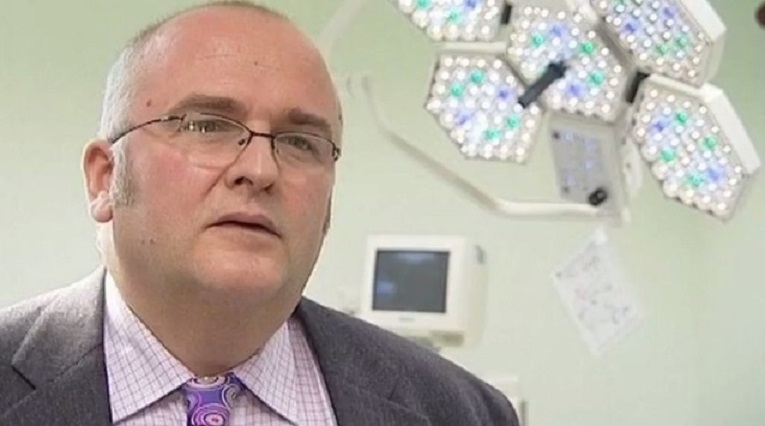Surgeon who etched his initials on patients' livers is convicted of assault
Sign up now: Get ST's newsletters delivered to your inbox

Bramhall (above, in a screenshot from an online video) used an argon beam to etch “SB” onto the livers.
SCREENSHOT: YOUTUBE
LONDON (NYTIMES) - A prominent British surgeon who etched his initials onto the livers of two patients, in a case that shocked many with its audacity, has been convicted of assault.
The surgeon, Simon Bramhall, who gained fame in 2010 after successfully transplanting a plane-crash victim's liver into a patient, pleaded guilty in Birmingham, England, on Thursday (Dec 14) to two counts of assault by beating.
The case divided opinion in Britain. Many have expressed outrage, while others - including some former patients - have defended him.
According to British news reports, Bramhall, 53, admitted to using an argon beam - an electrified gas jet that liver surgeons typically employ to stanch bleeding or to mark an area of operation on an organ - to etch "SB," his initials, onto the livers.
Argon beam marks are usually not harmful and would normally disappear. But they were apparently discovered by a colleague when one of the patients underwent a follow-up operation.
Bramhall was subsequently suspended from his position as a consultant surgeon at Birmingham's Queen Elizabeth hospital in 2013. He resigned a year later, and said his act had been a mistake.
Joyce Robins, who represented Patient Concern, a campaign group, was quoted by The Guardian as saying at the time: "This is a patient we are talking about, not an autograph book."
At Birmingham Crown Court on Thursday, the lead prosecutor, Tony Badenoch, said that Bramhall's guilty pleas "represent an acceptance that that which he did was not just ethically wrong but criminally wrong."
The surgeon's actions, he said, were "a highly unusual and complex case" without precedent in criminal law.
"It was an intentional application of unlawful force to a patient whilst anesthetised," he said. "His acts in marking the livers of those patients were deliberate and conscious acts."
Prosecutors said they had accepted a plea submitted by Bramhall denying a more serious charge, assault causing actual bodily harm.
Earlier this year, the General Medical Council issued a formal warning to Bramhall, saying that while his actions were not serious enough to "require any restriction" on his registration, his conduct had not met the standards required of a doctor.
"It risks bringing the profession into disrepute and it must not be repeated," the council said.
On Thursday, according to British news reports, Bramhall was released on unconditional bail, with a sentencing hearing scheduled for January. Assault can be punished with a fine, community service, or in the most serious cases a jail sentence of up to six months.
Bramhall could not be reached for comment this week.
Tracy Scriven, one of Bramhall's former patients, came to his defence.
"Even if he did put his initials on a transplanted liver, is it really that bad?" she told The Birmingham Mail in 2014, after Bramhall was suspended.
"I wouldn't have cared if he did it to me. The man saved my life."


